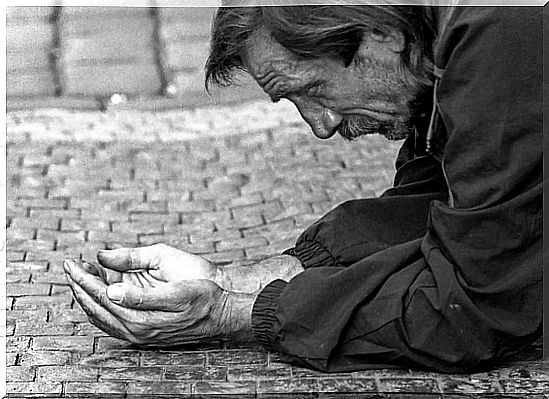Fighting Depression Is A Way To Fight Poverty

It is interesting that a study linked to happiness, poverty, depression and anxiety was not conducted by psychologists, but by a group of economists who investigated how these variables influence the quality of life. These researchers found a link between various mental illnesses and poverty. Fighting depression is actually a way of fighting poverty.
The study, conducted at the London School of Economists in England, used a group of 200,000 people around the world as a test population. It was led by Richard Layard, an expert on quality of life and happiness. One of his hypotheses was that happiness is more linked to psychosocial factors than income level, which is supported by the study.
But in general, the study proved something that Layard summed up in one sentence: “Fighting depression and anxiety would be four times as effective as fighting poverty.” This statement has received much criticism. Some people thought he was simply advocating for a downsizing of the fight against poverty. However, it is easy to see how poverty is born out of certain mental states, such as depression.
The numbers of depression around the world are alarming. The World Health Organization estimates that one in ten people in the world suffers from major depression, and one in five individuals has been affected at some point in their lives. But how is depression linked to poverty?
It has traditionally been viewed as follows: poverty comes with a tendency to depression. This comes from the idea that by not having enough money you become more likely to suffer from depression. This initially sounds pretty logical.

But studies like the one led by Layard show that there are people who, despite doubling their income, still have not increased their level of happiness. It is also easy to see that countries with high levels of consumption, such as Japan, also have high levels of depression. At the other end of the scale, we find various Latin American countries, where poverty is widespread but happiness is high.
One thing we do know is that depression wears on people, families and countries. People who are depressed are less productive and miss work more often. They must ultimately rely on welfare to get out of the state or find a solution to the impossibility of working. The Inter-American Development Bank (IDB) has indicated that up to 4% of a country’s GDP is spent on dealing with mental and emotional problems.
It is easy to understand that the lack that some people live in has a great emotional impact. In these circumstances, it is easy to fall into depression. But according to IDB, it is not poverty itself that causes depression – it is inequality. It is sad to live in a reality where some live in abundance while others experience total poverty.

Living in a consumer society is another contributing factor. The ability to spend money is often seen as a source of happiness. People believe that the ability to buy things without worrying about spending too much leads to inner peace and well-being. But there are hundreds of thousands of people who live in wealth, spend as much money as they want, but are still depressed.
The path from depression to poverty seems much more obvious than its opposite. People who are mentally healthy and motivated can deal with their needs firmly and energetically. They find it easier to find work and do not make decisions that plant the seeds of long-term poverty.
For example, they are less likely to suffer from unwanted pregnancies. Economists therefore stressed the importance of investing in mental health in addition to investing in order to directly combat poverty.
Mental health cannot be achieved with money, nor is it lost with lack of money. The problem goes deeper than that. It has to do with things that are imposed by the consumer society, where to be someone you have to have a lot. Investing in mental health is not about training more psychologists or opening more hospitals. It is rather about promoting times and places where people can get in touch with actual reality, not the one we see through the filter which are smart phones and anxiety. And of course also by building our lives in a healthier way.









